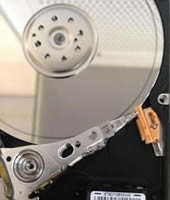HARD DISK
DATA RECOVERY

Hard Disk which cannot be detected by your computer.
Check your cables, power connectors. Sometimes it could be due to loose connection or bad connectors.
USB external drives which can be detected by the computer, but the drive cannot be seen and files cannot be read.
This disk is detected through its electronics. But the firmware could be defective, resulting in it not being able to initialise. On a more serious note, it could be because the heads are not reading and therefore, the disk information cannot be read by the system.
Hard Disk which can be detected by your computer, but files cannot be read.
In this case, the drive name can become a Local Disk or even RAW. These cases could mean that the partition is corrupted and data should be easily recovered with a low cost.
Disk fails to function and cannot start anymore.
This situation is a hardware failure. It could range anything from shorted pcb, disk motor jam or heads jam. Do not attempt to knock or bang your disk as it could result in more damage.
Accidentally dropped disks.
There are a few scenario if you drop your hard disk.
1) If the drop is not from too high a height or too hard, you still can use it if it is not damaged.
2) The heads gets dislodge from its resting site and may become stuck to the sides or on platter. This situation will require clean room operation to reset the heads, realign them and hopefully it still can read the data without heads replacement.
3) The heads gets dislodge and hits back to the platter resulting in damage to the heads. We will need to replace the heads to recover the data.
4) The drop makes the heads hit the platter and score the platters. In this situation, there is no chance of recovery. These cases are mostly caused when the disk is in operation when you drop the disk.
Disks salvaged from floods and fire.
If your disk is submerged in water, do not attempt to dry out the water. Keep the disk wet and send it to us. When the water dries out, contaminants will gets stuck to the platter and it will require tremendous effort to take them out with injuring the platters.
Disk with Clicking sounds.
If you have disks with loud clicking sounds, or it starts with 3-4 clicks and stops, do not attempt to power your disk any further. These are cases of heads damage and powering up your disk with further damage your platter.
In the above all cases, do not keep powering up your disk for to many time. Repeated attempts might make your already injured disk with further damages. Send it to us for our professional handling, which do not cost you anything for the evaluation and you can have a piece of mind.

